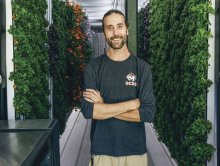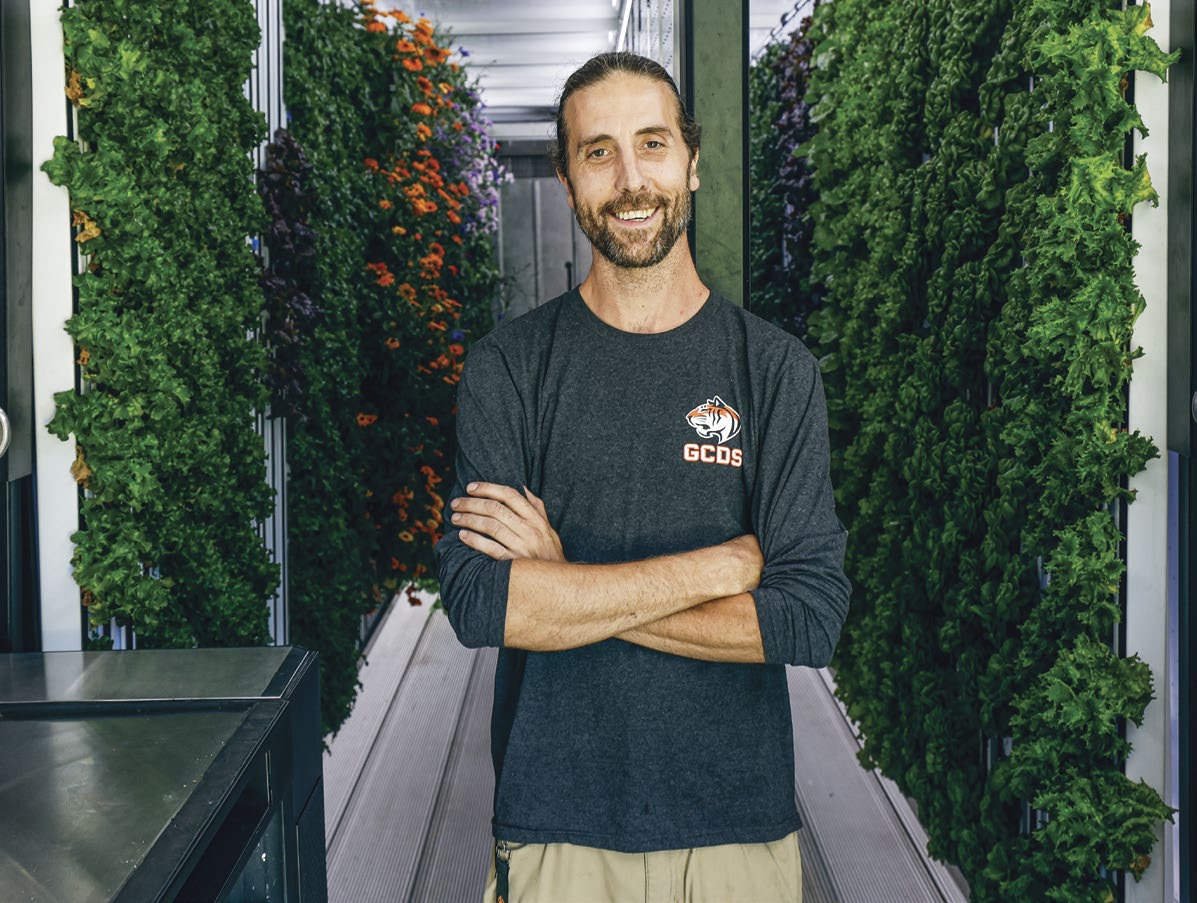
How did you become interested in farming, the natural world, and sustainability?
Since childhood, I have experienced immense joy and satisfaction in spending my days outside in nature. During college, I began to develop an interest in the environment, our place in it, and the impact we make with every choice. I realized how important it is to know where your food comes from or, if you have the luxury of time, space, and patience, how
to grow it yourself. What keeps my interest in nature is how amazing it is. It is vigorous. It is brutal. It is abundant. If given the right conditions, one plant can produce not only many fruits but also hundreds or thousands of seeds. I wanted to learn everything about this incredible process.
What did you do before you joined GCDS?
I worked at my father’s smokehouse business, which provided smoked salmon, seafood, caviar, and other fine foods and delicacies, since I was young. I went to college to study graphic design. My high school sweetheart, now wife, and I stayed in Maui for three months to work on a bamboo farm through an organization called World Wide Opportunities on Organic Farms (WWOOF), where people can travel and exchange work for room (and sometimes board) on many diverse types of farms. This allowed us opportunity to learn about an important sustainable, renewable plant and how it can be utilized in the construction of ecofriendly houses.
We visited rural Ukraine and stayed for several months, experiencing and learning about how they grow and preserve their food. When we first entered their cellar, it was filled with jars of foods that had all been preserved by them from their garden. I learned how to operate hydroponic systems in Colorado for a few months under a work exchange program. All these experiences helped to instill a love for homesteading, self-sufficient living, and sustainability. On each trip, we would come back home with new projects and inspiration.
After learning how to shape and care for the land, I started a job with the State of New York in their Facilities Department at SUNY Purchase, where I learned how to professionally landscape and maintain a university campus of 600 acres. The union there provided me educational vouchers, so I enrolled in carpentry and construction classes. After SUNY, I began working under a master carpenter, remodeling, renovating, and repairing houses throughout Fairfield County. The skills I learned under him were invaluable and have helped make me the perfectionist I am today. The trades I’ve learned over the decades are all focused on managing and caretaking beautiful properties just like the French Farm, and I am beyond ecstatic to contribute my skills towards that goal.
What is your role on the farm? Your main responsibilities?
My roles at French Farm and in the Hydro Farm revolve around maintaining the space, improving the systems, repairing various elements, caring for the flora and fauna, and educating visiting students and guests. When I was hired, I thought this was going to be a job mainly focused on maintaining the French Farm property and Hydro Farm. However, I frequently find myself in positions of educating students. I have loved pickling with Mr. Perry’s Botany class, landscaping with Dr. Barratt’s Ecological Engineers, helping a student hold a chicken that was raised in Ms. Molyneux’s class, discovering the intricate process of extracting indigo dye led by Mr. Simpson and Ms. Clark, spinning honey with Joel Dawson, a local beekeeper, singing and playing instruments with Abilis, or participating in any of the numerous amazing programs Farm Manager Aaron Sinay coordinates and plans throughout the year, such as the Grade 3’s Stop Along the the Oregon Trail. Whenever the farms need anything, Paul Clarke, Dave Krumlauf, and Aaron Sinay each provide me with whatever is required, and it is obvious that everyone is very invested and cares about GCDS. It is unlike any working environment I’ve known.
What skills, knowledge, and values do our students learn from their work on the farm?
The farms at GCDS grant a multitude of opportunities for learning in various fields of study. On the French Farm, Mr. Sinay has organized the experiences into four “buckets”: growing, cooking, sustainability, and art. On any given week, you’ll see students roaming around taking pictures of a rusty tool or sketching a beautiful flower. You’ll hear children loudly mimicking the call of one of our peacocks perched 20 feet above them as they stare in awe at the plumage. You’ll see children eagerly trying to hand-feed our sheep, Tina and Oreo, after learning how to card and draft their wool into yarn. You’ll smell fresh pizza being made by kindergartners in the ovens outside the stables. You’ll watch as the 6th grade digs into the soil for samples to examine or watch their eyebrows raise as you explain the anatomy of a flower.
Farm life instills values earned through hard work in tough weather and conditions. Students learn tenacity and persistence when tackling weeds and vines. They learn dedication and commitment when heaving a large gemstone, boulder, or slab of petrified wood to a new location. They learn patience when planting a seed and perseverance when it doesn’t grow as intended. Even after everything that we’ve done, I feel like there are still so many opportunities and experiences at the French Farm for students to learn.
At the Hydro Farm, high school students learn a great deal about sustainability, systems thinking, agribusiness and agriscience, hydroponic farming, STEAM education, and more. The specific container farm we utilize is the same Freight Farm used in over 70 universities. The knowledge they learn in the Hydro Farm directly translates into job experience, and the hours they earn can be applied towards their Sustainability Diplomas. Learning how to operate and maintain a hydroponic farm opens up new opportunities to other professions such as aquaculture and growing microgreens. It’s hard to quantify how amazing it is for a student to harvest a bag of lettuce with their friends, bring it up to the dining hall 100 yards away, and then consume it for lunch an hour later. There’s still so much we have planned to incorporate, which utilizes other assets the school has, like the Maker Space, or getting more students consistently in the Hydro Farm with the new class, Agriscience and Agribusiness, being offered in September.
As an alum, what do you remember about your time at GCDS? How does it feel to be back working here?
The first thing that comes to mind is the massive orange books we received of all of our assignments throughout the school year, bound into a tome of accomplishments one could go back and reference at any time. I love being able to look at my progress through the years and to see how I perceived the world. I remember the familial nature of the campus and the nurturing community. Being back today in 2024 feels serendipitous. Greenwich Country Day School is a great community of people who care and who wake up each day to help teach and inspire children to live amazing lives in this amazing world.














.JPG&command_2=resize&height_2=85)





